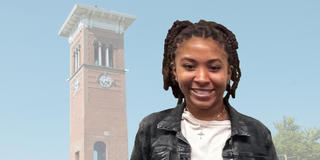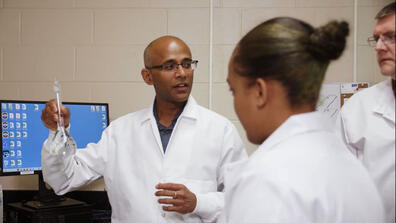Business major goes from ‘academic distress’ to mentoring fellow Marauders

Majoring in business, Cincinnati-born Central State University junior Tyler Wooten fell into an especially difficult situation during her freshman year. The scenario — an inexplicable medical issue involving her left shoulder and arm whose cause was never fully determined by the variety of doctors she consulted — sadly plunged Wooten into the collegiate status known as “academic distress” followed by “academic probation.”
The near-total inability to use the upper left side of her body, especially as a left-handed person, rendered Wooten barely able to attend class, study, or complete her schoolwork. The devastating pain — both physical and emotional — interrupted her sleep cycle in such a profound way that she could hardly get a few hours in each night.
A high-achieving student in high school, Wooten found herself in the second semester of her first year at Central State exhausted, frustrated, scared, ashamed, and — worst of all — helpless about her plight.
“I’m not going to say what my grade point average was,” Wooten disclosed, “but let’s just say it was really low. And none of the doctors I was seeing had any idea what was wrong. They didn’t know if it was (multiple sclerosis) or what. They gave me medicine that didn’t do anything. Some said that, whatever it was, it was incurable.
“All I knew was that I was in extraordinary pain that made it so I couldn’t get any of my schoolwork done at all,” Wooten said. “It was just horrible. Wow, it was stressful. I used to cry at night because of how bad everything was. The pain was so crucial, I couldn’t think about my classes at all.”
Her “really low” GPA (grade point average) resulted in Wooten being placed on academic suspension, meaning she was not allowed to return to Central State for one semester.
Wooten moved back home with her parents and took a day job, saving up money, seeing more medical professionals about her arm and shoulder, and figuring out how she could best make her way back to school once her probation period ended.
Luckily, and just as inexplicably as it had appeared, Wooten’s pain diminished almost entirely during this time of reflection and rehabilitation. She still has some trouble reaching to her back with her left hand, and occasionally a subtle amount of the pain she had experienced before does return. Feeling much better overall, though, and having regained the confidence to come back to Central State, Wooten returned to both her classes and life on campus.
Wooten explained that she knew she wanted to work toward finishing her college degree and that she wanted to do so through Central State.
“I like being at an HBCU (Historically Black Colleges and Universities),” Wooten said. “All through elementary and high school, I never had a Black teacher. I was always at a predominantly white school. I wanted to stay with people of my culture.”
When Wooten first came to Central State as a high school student looking at various colleges to which she might apply, she immediately believed that she could see herself at the Institution whose campus “really caught [her] eye,” as she put it.
“And I also have family members who go here — my cousins,” Wooten continued. “I feel more comfortable here than I think I would somewhere else.”
In reestablishing herself as a Marauder, Wooten filled out the appropriate paperwork, took the required USS (Undergraduate Success Seminar) 1200 seminar needed to acclimate back into the University ecosystem, and quickly saw her GPA shot back up to the high range she was used to from her successful days in high school.
“I’m back to getting A’s and B’s, just how I did in high school when I was on the honor roll every semester,” Wooten said. “I’m so happy I’m doing better now. My mom went to Wilberforce but didn’t graduate. My dad didn’t go to college. So, I want to be the first person from my immediate family to successfully graduate.”
Wooten is proud of the fact that she’s “taking care of business” and “doing what needs to be done” to become independent from her parents upon her imminent graduation.
“I’m just trying to get everything right so that I can graduate and get on the right path,” Wooten added.
This path includes having taken on a position working three days a week at the Lionel H. Newsom Administration Building Information Center. It was here where, this past spring, Wooten was approached by CSU Undergraduate Student Success Center’s LaKeysha Smith to take part in a special panel of students who had gone through similarly tempestuous but ultimately successful scholastic journeys.
“I was excited about that opportunity,” Wooten, who joined four other students on the panel, said.
“I was nervous, too. But I got all dressed up and showed up. I told the other students there who had messed up but were now coming back to school that they need to take this seriously, it’s not a joke, and you can’t just party while you’re here. You need to go to class. You need to do your work. You need to manage your time and do what you need to do to not waste your time or money while attending school.”
LaKeisha Jenkins Washington, executive director for Central State’s Undergraduate Student Success Center (USSC), partners with Smith in addressing concerns about students such as Wooten finding themselves in academic distress and academic probation.
Smith, Jenkins Washington said, “has a very robust strategy that she uses to advise our freshmen.” Complementing Smith’s work, Jenkins Washington added that the USSC has “utilized a tool that will assist students with early alert systems.”
Such an alarm system, Jenkins Washington continued, will greatly aid students who may be in academic distress by recording pertinent data about that specific student’s scholastic journey and relaying this intel to the student’s academic advisor for analysis and, hopefully, viable resolution measures.
“We are doing what we can to be intrusive in the academic workflow of our students, making sure they are properly advised through courses that they need to take so that they can more properly achieve their goals of success,” Jenkins Washington said.
Other means of supporting Central State students come from the centralizing of tutoring services and supplemental instruction through the Institution’s Office of Academic Support and Instructional Services (OASIS), whose location is now based outside of the Hallie Q. Brown Memorial Library.
“We also work closely with incoming freshmen students prior to their arrival date in order to make sure they’re introduced to the resources offered here at Central State,” Smith said. “We work through the entire summer to do this.”
Such resources include the Student, Orientation, Advising, and Registration (SOAR) programs. It is through these programs that USSC works closely with Central State’s Enrollment Management, Admissions, Registrar’s, Financial Aid and Scholarships, and Cash Management offices to aid, throughout the summer, the transition of high school graduates becoming Central State students.
These advising services are in place to assist Central State freshmen who may not have acquired enough credits to move into sophomore status. This initiative helps them better accomplish their credits in the new academic year, as well.
There's also the class that Wooten was required to take in coming back to Central State, USS 1200, which assists Marauders who may need an expanded comprehension of necessary study and scholastic work skills in order to be more academically successful. Such skills include time management and, as Jenkins Washington defined it, understanding what it means to set SMART (Specific, Measurable, Achievable, Relevant, Timebound) goals.
Although she had to refrain from revealing any specific number due to lack of specific census data, Smith said she is hopeful about the future due to a markedly improved projected retention rate (students returning to Central State after passing through their freshmen year) for the next academic year.
“We’ve definitely been seeing an improved retention rate,” Smith said. “And that is due to the activities presented by Mrs. Jenkins Washington and the advising staff and USSC staff working hard year-round. We are really looking forward to building our relationships across the college to show even more improvement in the very near future.”


